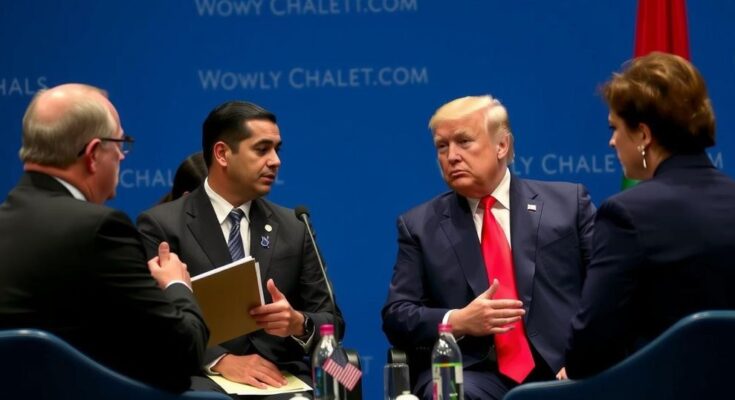President Joe Biden’s visit to Peru and Brazil marks a crucial moment for international summits, as attention shifts to Donald Trump’s anticipated return to the presidency. During the visit, Biden aims to address key global issues while engaging with world leaders amid anxieties surrounding the upcoming transition of power. The focus on Trump’s prospective policies raises fundamental questions about future U.S. foreign relations, particularly with China.
On Thursday, President Joe Biden embarked on a pivotal six-day visit to Peru and Brazil for significant international summits, while global leaders remain attentive to former President Donald Trump’s expected return to the White House. Biden’s attendance at both the Asia-Pacific Economic Cooperation (APEC) summit and the Group of 20 (G20) provides him a final opportunity to engage with key world leaders he has collaborated with in recent years. As Biden continues to assert the importance of American alliances, attention is on how Trump’s potential policies may differ dramatically following his expected assumption of office. World leaders are not only congratulating Trump but are also strategically analyzing his prospective picks for national security and foreign policy roles, including selecting Florida Senator Marco Rubio for Secretary of State and Representative Mike Waltz as National Security Adviser, both recognized as staunch critics of China. Meanwhile, Biden aims to address pressing global issues including climate change, global infrastructure, and the ongoing crises in Ukraine, Gaza, and Lebanon. Biden’s meetings in Brazil include a notable interaction with Chinese President Xi Jinping, marking their first discussion since April. The Biden administration is committed to maintaining a dialogue with China amid escalating tensions, particularly concerning China’s alleged support for Russia’s military efforts. Furthermore, inquiries into Chinese cybersecurity threats against Trump and his associates are expected to arise during their discussions. Ultimately, while Biden hopes to reassure allies regarding the continuity of U.S. foreign policy amidst the transition, global leaders remain cautiously waiting to observe how Trump’s presidency will unfold. This transition presents a significant moment for Biden to affirm the stability of democratic processes, contrasting with the uncertainties perceived by the international community as Trump’s return approaches.
The article outlines President Joe Biden’s crucial visit to Peru and Brazil for high-profile summits, including APEC and G20, while examining the shifting focus of global leaders towards Donald Trump’s potential return to presidential office. It investigates the implications of Trump’s presidency on international relations, particularly regarding foreign policy and national security, while contrasting Biden’s administration objectives and strategies. In addition, the text provides insight into the complexities of U.S.-China relations during this transitional period, further illustrating how past experiences with Trump influence current diplomatic discourses.
In conclusion, President Biden’s visit to South America symbolizes a final opportunity to reinforce U.S. commitments to global alliances as the world anticipates Donald Trump’s return to power. While Biden seeks to solidify ongoing international collaborations on critical issues, Trump’s influence looms large, prompting leaders to reconsider their diplomatic strategies. As Biden engages with global counterparts, he must navigate the complexities of a transition period that raises significant questions about the future trajectory of U.S. foreign policy and international relations.
Original Source: www.komonews.com




